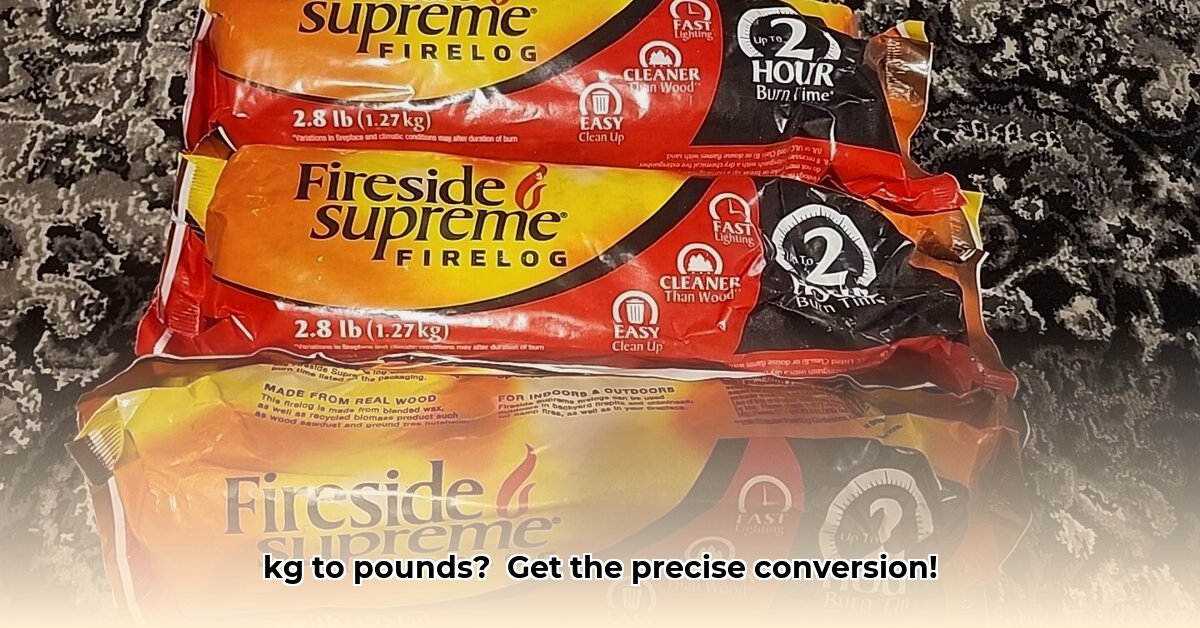
Understanding Kilogram to Pound Conversions
Converting kilograms (kg) to pounds (lbs) is a common task, whether you're baking, shipping, or conducting scientific research. This guide provides multiple methods, from quick estimations to highly precise calculations, ensuring you choose the approach best suited for your needs. We'll explore different levels of accuracy and explain the underlying principles. For more detailed information on converting 235 lbs to kg, see this helpful converter.
The Quick Estimate Method
For a rapid, approximate conversion, a simple mental shortcut exists. Double the kilogram value and add approximately one-tenth. For 1.27 kg:
- Double: 1.27 kg * 2 = 2.54 lbs
- Add one-tenth: 2.54 lbs + 0.25 lbs ≈ 2.8 lbs
While not perfectly accurate, this method provides a reasonable estimate for everyday situations. It's a handy tool when speed is prioritized over extreme precision. Is this level of approximation suitable for your needs?
The Precise Conversion Method
A more accurate result is obtained using the standard conversion factor: 1 kg ≈ 2.2046 lbs. Let's apply this to 1.27 kg:
- Multiply: 1.27 kg * 2.2046 lbs/kg ≈ 2.7985 lbs
This calculation yields a significantly more precise result than the estimation method. This level of precision is suitable for many applications, where a small margin of error is acceptable. Do you need a more precise answer?
The Highly Precise Conversion: Pounds and Ounces
For ultimate accuracy, we can break the result down into pounds and ounces. Remember, 1 lb = 16 oz.
- Identify the decimal: From the previous calculation, we have 2.7985 lbs. The decimal is 0.7985 lbs.
- Convert to ounces: 0.7985 lbs * 16 oz/lb ≈ 12.78 oz
- Final Result: Therefore, 1.27 kg is approximately 2 lbs and 12.78 oz. You might round this to 2 lbs and 13 oz for practical purposes.
Comparing Conversion Methods: Choosing the Right Approach
The optimal method depends on the application's required precision:
| Method | Calculation | Result (lbs) | Accuracy | Application Examples |
|---|---|---|---|---|
| Quick Estimation | Double kg + 0.25 | ≈ 2.8 lbs | Low | Casual estimations, quick shopping calculations |
| Precise Conversion | Multiply kg by 2.2046 | ≈ 2.7985 lbs | Moderate | Many everyday applications, general conversions |
| Precise Conversion (lbs & oz) | Multiply kg by 2.2046, convert decimal to oz | ≈ 2 lbs 12.78 oz | High | Situations requiring high accuracy; scientific applications |
Remember, the more decimal places you use in the conversion factor, the more precise your result will be. For highly precise scientific work, using the full conversion factor (2.20462262185) is strongly recommended.
Scientific Applications: Maximizing Accuracy
In scientific contexts, minimizing errors is crucial. The accuracy of your conversion depends not only on the conversion factor but also on the precision of your initial kilogram measurement. Rounding errors during calculations can also accumulate, impacting overall precision. Always strive to utilize the most precise conversion factor available and understand the potential sources of error in your process. The application of the correct level of precision depends entirely on the context of your scientific project and required margin of error.